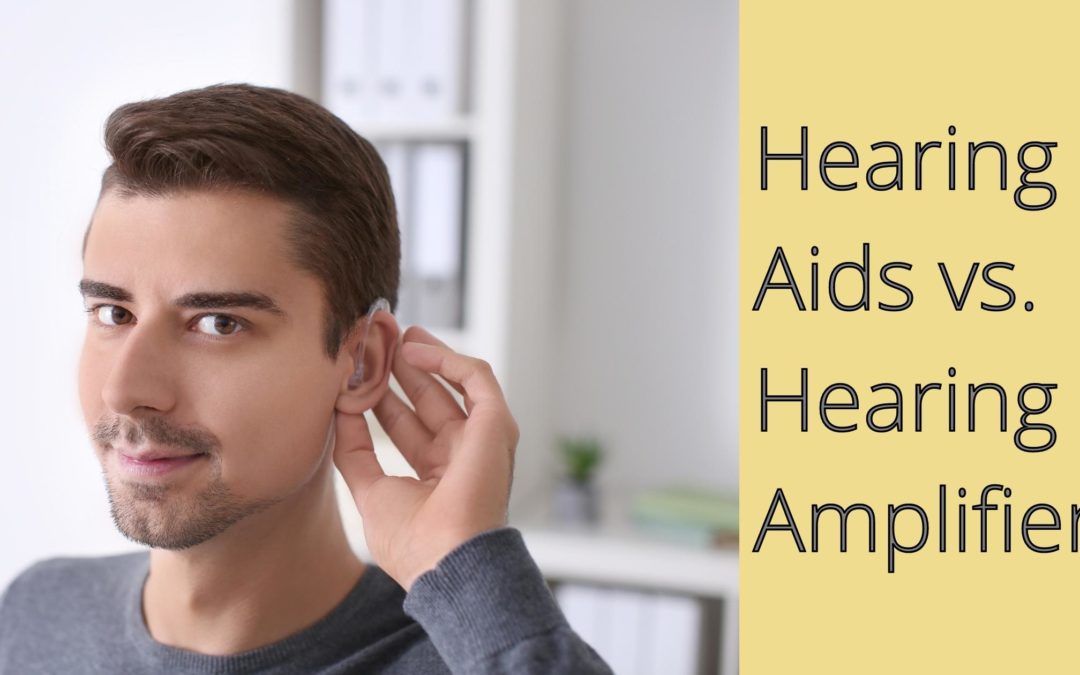Addressing changes to hearing health can be challenging. Coping with hearing loss, one of the most common chronic health conditions, requires learning new ways to navigate daily life. With the extensive information and wide range of hearing devices that are available, it can be difficult to determine what is best for you. Hearing aids are the most common treatment for hearing loss which can be confused for hearing amplifiers. These devices provide hearing support but have key differences that you should be aware of!
Hearing Aids vs. Amplifiers: Key Differences
Though they both work to amplify sound and look similar, there are significant differences between hearing aids and hearing amplifiers (also referred to as personal sound amplifiers). So what exactly are these devices and what are the differences?
- Hearing Aids: these are medical devices that are regulated by the FDA and are customized to an individual with diagnosed hearing loss. Hearing aids are tailored to meet the specific hearing needs of the wearer and are prescribed by hearing healthcare specialists (like audiologists).
- Hearing Amplifiers: whereas personal sound amplifiers are readily available over the counter and are designed to simply boost sound. They are not actually intended for people with hearing loss and specific hearing needs. Hearing amplifiers have microphones that pick-up and amplify sound; this sound is not altered in any way.
In addition to hearing aids being regulated and intended to compensate for hearing loss, other major differences include:
- Adjusting sound: hearing aids have advanced processing systems that can automatically adjust sound to meet the wearer’s specific hearing needs. This could include amplifying select sounds, reducing background noise, cutting feedback etc.
- Features: hearing aids also have a range of features and technologies that are designed to maximize sound and user experience. This includes Bluetooth technology which allows hearing aid devices to wirelessly connect to other electronic devices and stream audio directly, voice recognition technology, customized settings for specific activities etc.
Personal sound amplifiers are not customizable, do not have additional technologies, and are not intended for all of the time use. If you have any degree of hearing loss, it is critical to receive individualized treatment that addresses your specific impairment.
Hearing Loss Symptoms
Recognizing hearing loss symptoms can help with early intervention. Hearing loss reduces a person’s ability to absorb and process sound which produces a range of symptoms including the following:
- Tinnitus: a buzzing, ringing like noise in one or both ears
- Regularly increasing the volume on electronic devices (TV, phone, speaker etc.)
- Sounds are muffled or slurred, making it difficult to identify specific words
- Difficulty hearing, especially in backgrounds with loud noise
- Moving to a quieter area to have a conversation
- Frequently asking others to repeat themselves, speak loudly, and/or slowly
- Being able to hear better in one ear over the other
- Feeling confused, exhausted, and/or frustrated during conversations
These symptoms can be experienced mildly to profoundly which can really take a toll on daily life by straining communication. This can impact relationships, job performance, social engagement and daily wellness. Addressing hearing loss is a necessary step in not only improving your hearing, but your overall health!
Seeking Treatment
The first step is to schedule an appointment for a hearing test with our team! Hearing tests involve a noninvasive and painless process that identify any hearing impairment and the degree to which you are experiencing it. This establishes your hearing needs which informs the most effective treatment for you.
We are here to discuss your options and guide you on the journey to better hearing!


